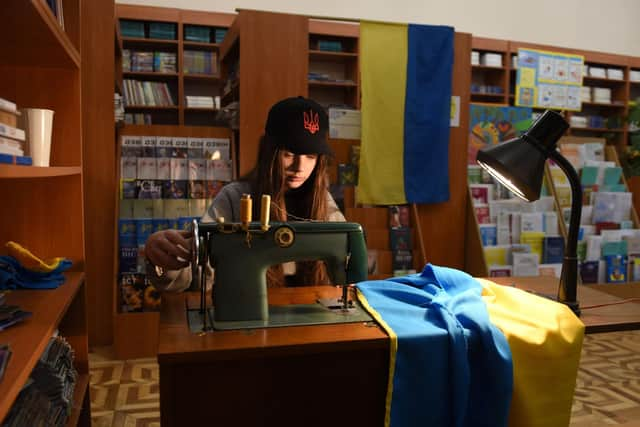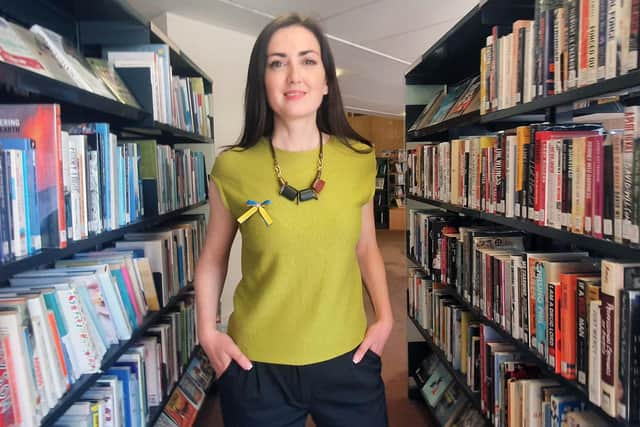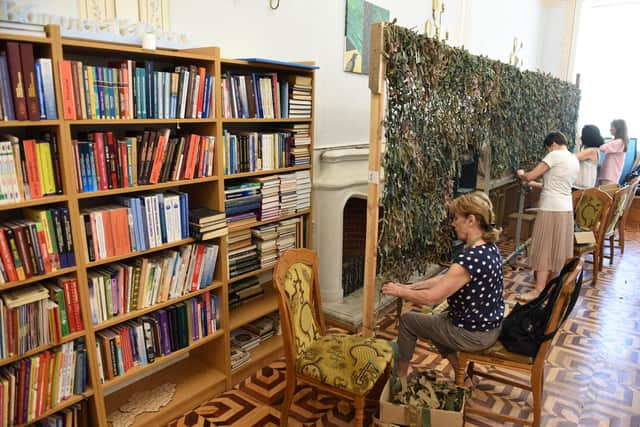How Ukraine’s librarians mobilised to fight the Russian culture war
Within days, libraries across the country had set up initiatives to supply books to citizens sheltering in underground Metro stations, had created centres for refugees displaced within Ukraine in library buildings and diversified to set up to act as hubs to supply military equipment and essentials to the hastily-formed army.
“Crazy Ukrainian librarians,” says Oksana Boiarynova, a member of the Ukrainian Library Association Board, who is on a visit to Scotland – planned and funded before the war - to share ideas about how libraries can support democracy. “They are very creative.”
Advertisement
Hide AdAdvertisement
Hide AdSince the invasion began in February, 60 Ukrainian libraries have been destroyed, while more than 230 others have been damaged by shelling and fighting. Official figures do not include those libraries within cities which have been almost entirely destroyed under Russian occupation, such as Mariupol, as Ukrainian authorities have not been able to access them to assess the damage. It is likely, however, that they, too, have been wiped out.


Deliberate damage to cultural buildings is regarded as a war crime under the Hague Convention of 1954, with attacks on structures such as theatres, libraries and monuments punishable by the International Criminal Court.
Many libraries across Ukraine have been transformed into volunteer social centres to help the army of Ukraine – and displaced people who have been forced to leave their homes.
“For the needs of the army, librarians weave camouflage nets, sew elements of military equipment, bed linen and medical gowns for the needs of local hospitals,” says Ms Boiarynova. “They also knit socks, collect books for the military and prepare food for them.”
In larger cities, libraries have opened as basement bomb shelters – with added entertainment.


"Libraries now operate around the clock to provide their basements as shelters for city residents,” she adds. “Here librarians organise leisure. Adults are offered books and the internet, children watch cartoons and films, draw, read, play board games.”
Meanwhile, librarians have banded together with international volunteers to create SUCHO (Saving Ukrainian Cultural Heritage Online) - an initiative of more than 1,300 volunteers who are collaborating online to safeguard Ukrainian cultural heritage.
Since the start of the invasion, SUCHO has web-archived more than 5,000 websites and 50TB of data of Ukrainian cultural institutions – ranging from national archives to local museums, from 3D tours of churches to children’s art centres - to prevent these websites from going offline.
Advertisement
Hide AdAdvertisement
Hide AdIt is hoped in the future, Ukraine’s rare books collection could be digitised for preservation, in fear of more of its library collection being wiped out by Russian shells.


Early in the invasion, Taras Voznayak, director of the Lviv National Art Gallery in Ukraine, pointed to the importance of the preservation of Ukrainian art and literature in the cultural fight against Russia – which he said is tied up in the physical conflict.
“Putin knows that without art, without our history, Ukraine will have a weaker identity,” he said. “That is the whole point of his war – to erase us.”
In some areas of the country, literature, as part of Ukrainian culture, has been one of the invading forces’ major targets. Ukrainian schools in occupied areas have been stripped of books in the Ukrainian language, where invading forces have made bonfires out of textbooks.


In May, the Ukrainian authorities warned Russian invaders were “deliberately” destroying all literature in the Ukrainian language as they raided towns and villages. The Kremlin has claimed Russian speakers in Ukraine have suffered discrimination and persecution under the government led by president Volodymyr Zelensky – an accusation Ukraine has long denied. Many citizens in the east of Ukraine, where Russian is more common, have said they use Russian and Ukrainian interchangeably in their everyday lives and have not faced any problems.
Nikita Poturaev, chairman of the Committee on Humanitarian and Information Policy in Ukraine, said at the time that all kinds of books - from children’s books to textbooks and works of fiction - were being destroyed systematically.
“If they see the Ukrainian language, the Ukrainian characters, they destroy them, as the Nazis behaved,” he said.
Books which are believed to be particular targets of Russian troops include those detailing the history of the “Maidan” – a series of pro-European, pro-democracy protests, which ultimately led to the ousting of then-President Viktor Yanukovych, the overthrow of the Ukrainian government – and ultimately, the beginning of new conflict with Russia. Some scientific and historical literature is believed to have been branded “extremist” by Russia.
Advertisement
Hide AdAdvertisement
Hide AdFor children still living in the occupied regions, a Russian curriculum is set to be introduced in the new school year, with only Russian literature and materials – and in some cases, Russian teachers, brought in from Russia. Those Ukrainian teachers remaining have been instructed to teach in the Russian language and to Russian instructions.
Russia has long claimed that part of its justification for invading Ukraine is to protect Russian speakers, most of whom live in the east of the country. Many Ukrainians say they mix Ukrainian and Russian interchangeably in every day life without any problems.


However, just weeks before the Russian army began to destroy Ukrainian books, the Ukrainian authorities said they were working on removing "Russian propaganda literature" from Ukrainian libraries. Instead, the texts will be replaced with Ukrainian literature and works that have been published by Ukrainian publishers.
The Ukrainian government insists it is following very strict criteria to what constitutes “propaganda”.
"It is important to follow the Constitution and laws of Ukraine as a democratic country and the martial law, to balance freedom of information principles and to counter Russian propaganda,” says Ms Boiarynova.
Ukraine says the process of championing its own culture, while moving away from that of Russia – a process which has been previously referred to as “de-Communisation” but is now more commonly known as “de-Russification” – is necessary to undo years of Moscow-led policies aimed at stamping out Ukrainian identity.
In June, its parliament voted through two laws that will place severe restrictions on Russian books and music.
Books by authors who hold or held Russian passports can no longer be printed in Ukraine, unless they renounce their Russian passport and take Ukrainian citizenship. The ban will only apply to those who held Russian citizenship after the 1991 collapse of Soviet rule. It will also ban the commercial import of books printed in Russia, Belarus and occupied Ukrainian territory, while also requiring special permission for the import of books in Russian from any other country.
Advertisement
Hide AdAdvertisement
Hide AdUkraine’s culture minister, Oleksandr Tkachenko, said he was “glad to welcome” the new restrictions.
“The laws are designed to help Ukrainian authors share quality content with the widest possible audience, which after the Russian invasion do not accept any Russian creative product on a physical level,” he said.
While Russian and Ukrainian come from the same roots and are said to share around 62 per cent lexical similarity, many speakers of Russian cannot understand Ukrainian and vice versa. Now, following the invasion, many Russian-speaking Ukrainians are keen to move closer to their cultural roots.
As a result, demand for Ukrainian language classes at libraries, particularly in the east of Ukraine, has rocketed, says Ms Boiarynova. Held for the previous 30 years before the war, to encourage Russian-speaking Ukrainians to become more comfortable in the language, since February, more people have signed up for classes to improve their fluency in the language.
"Many Russian-speaking people refuse to use the Russian language. So more and more libraries are expanding their services specifically in the study of the Ukrainian language,” she adds.
The library network has also launched a Ukraine-wide initiative to send Ukrainian-language books to refugee families who have fled to other part of Europe and beyond.
“We hope everyone will be able to return as soon as possible, so children need to be able to keep reading Ukrainian literature,” Ms Boiarynova explains. “They want to come back to our schools and our school programmes.”
Other literacy-based projects are ongoing to keep written Ukrainian culture and language alive while its citizens are scattered across the globe. UNESCO (United Nations Educational, Scientific and Cultural Organization), in cooperation with international agencies including the Norwegian Agency for Development Cooperation (NORAD), the Global Digital Library, and United Nations refugee arm UNHCR, in April launched the Translate a Story Ukraine campaign to translate at least 100 early-age digital books into Ukrainian. The translated books are proofread and made available on the Global Digital Library and local Ukrainian online platforms to allow refugee children to access them through mobile phones, tablets and other learning devices.
Advertisement
Hide AdAdvertisement
Hide AdMeanwhile, the Ukrainian Book Institute and the Federation of European Publishers issued a crowdfunding campaign for printing thousands of Ukrainian children’s books in Europe. For newly settling refugees, individual national libraries, ministries and Ukrainian networks have been purchasing and printing Ukrainian children’s books en masse.
However, while the library network has rallied, in total, 2,475 libraries – out of around 15,000 across the country – are currently closed due to the invasion, due to a mixture of damage and infrastructure, funding or staffing problems directly linked to the war.
"They are closed because, for example, they need new computer systems, or they do not have staff. We have 21 libraries where literally none of the collection has been preserved,” Ms Boiarynova says. “Many librarians were forced not only to leave their jobs and libraries, but also to abandon their homes and hometowns.”
She points to the Russian troops’ shelling of the Kramatorsk railway station in April, when an attack killed 62 people who were trying to flee the occupied territories – including two local librarians.
"They were waiting for the evacuation train and died there,” she says.
The Ukrainian Library Association has joined forces with the Library Country Charitable Foundation to establish a fund to provide financial aid to librarians living in or near the front line fighting. A total of 150 library workers have benefited from the $10,000 of donations, to help them pay for essential costs such as the rental of temporary accommodation after being forced to flee their homes, as well as buying medicine, clothes and food.
Funds have also been gathered from international bodies to prepare for rebuilding libraries after the war ends.
Librarians have been encouraged as a group to join in a national drive to collect contemporaneous information, documents and stories about the war for the National Digital Library of Ukraine. The project, called My War, has seen more than 3,000 personal stories published by the beginning of July, according to the Ukrainian Ministry of Culture.
Advertisement
Hide AdAdvertisement
Hide Ad"Our librarians are collecting facts, posters and stories about this war,” Ms Boiarynova says. “They are also helping to record oral histories, speaking to people in occupied territories and making stories. A lot of librarians have been involved – through their own stories too.
"History, culture, everything, is concentrated in libraries.”
Personally, Ms Boirarynova has tried to continue with ordinary life as far as possible. Even while in Scotland, she is still checking her phone for air raid alerts, which are issued regularly – often throughout the night – via the Ukrainian government’s Telegram account, to check on the safety of her family.
From Kyiv, she moved to the central part of the country for two months when war broke out, but decided to move home after intense fighting in the capital’s suburbs receded.
"There is no safe place in Ukraine,” she says. “We live with the knowledge that missiles and bombs could be anywhere. We have now returned to Kyiv and are trying to live a normal life, to work and to support the army.”
Sean McNamara, head of CILIPS (The Chartered Institute of Library and Information Professionals in Scotland) says the Ukrainian library network's work is of “vital importance” to protect the country’s literary heritage.
He says: "So often during war or invasions across the world, cultural institutions such as libraries and archives are damaged either significantly or beyond repair. This is either a by-product of the war or a targeted attempt to decimate a nation's history and heritage. This has sadly been seen again in Ukraine, with both libraries being damaged and also some library workers being killed or injured.
“Ukraine is a nation with a rich literary heritage and tradition. Its libraries and archives are home to great collections of works of literature, history and research, documenting the development of Ukrainian culture, identity and language. It is of vital importance to ensure that this body of knowledge, research and creativity is protected for future generations.
Advertisement
Hide AdAdvertisement
Hide AdHe adds: “Despite the damage to many Ukrainian libraries, it has been very impressive to hear that Ukrainian library workers are still finding ways to support their communities by providing resources such as books to people sheltering or taking steps to counter misinformation or disinformation. This type of work reflects the core values of libraries and librarians in supporting equity of access and defending the truth - things that are never more important than during national crises, regardless of where in the world they are happening.”
He says Ukrainians who have sought shelter in the UK have turned to Scottish libraries to help them. CILIP has launched a free membership for Ukrainian librarians and information professionals displaced by the invasion who find themselves in the UK, to allow them to access advice on finding work and access to job listings.
He says: "Scotland's libraries and librarians have also been supporting Ukraine by either collecting donations or providing information, support and services for refugees. Libraries are and always have been places of sanctuary and are often one of the first ports of call for new arrivals in places."
Comments
Want to join the conversation? Please or to comment on this article.
